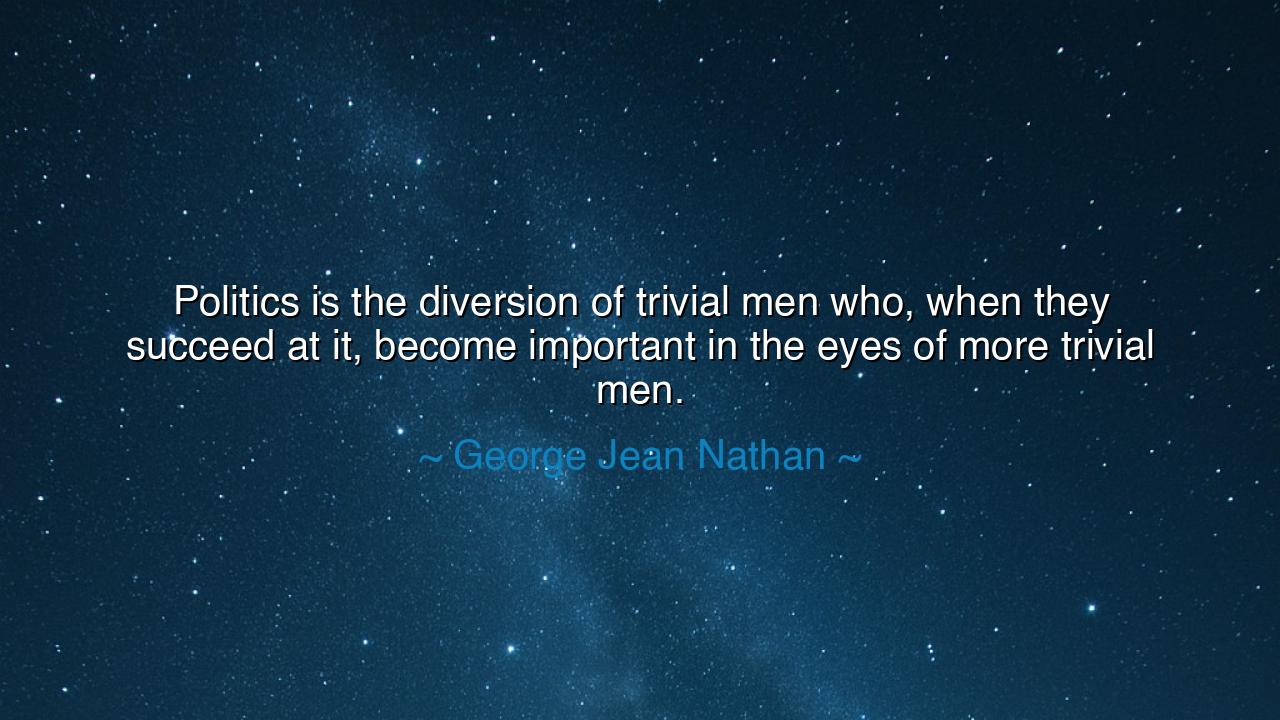
Politics is the diversion of trivial men who, when they succeed
Politics is the diversion of trivial men who, when they succeed at it, become important in the eyes of more trivial men.






Hear, O children of discernment, the biting words of George Jean Nathan, the critic who laid bare the follies of power: “Politics is the diversion of trivial men who, when they succeed at it, become important in the eyes of more trivial men.” In this utterance lies not flattery but scorn, a warning against the emptiness of ambition when it is unmoored from virtue. Nathan unmasks politics at its worst—as a game for the petty, where small minds chase hollow crowns and are celebrated by those who do not see beyond appearances.
For to call men trivial is to say they are consumed by vanity, not by greatness. Such men enter politics not to serve, but to be seen; not to heal, but to climb. They thrive on spectacle, flattery, and rivalry, mistaking noise for power. And when they rise, it is not by wisdom or justice, but by appealing to the triviality of others who mistake performance for substance. Thus Nathan reminds us that the danger of politics is not only in its players, but also in its audience.
History gives us mirrors of this truth. In ancient Rome, the emperors who built glory upon bread and circuses held sway over the crowds, not by greatness of vision, but by pandering to appetite. Nero, who burned the city and played his lyre, was adored by many for his spectacles, though he led the empire to ruin. He was a trivial man, exalted by the trivial many, his reign proving Nathan’s words across centuries.
Yet Nathan’s judgment is not only mockery—it is also warning. For politics need not be trivial. When men and women of depth, courage, and vision enter its halls, it becomes the instrument of justice. But when those of small spirit dominate, the system devolves into a theater of vanity, where the applause of the shallow crowns the unworthy.
Therefore, let this wisdom endure: politics is as great or as small as those who inhabit it. It can be the realm of statesmen who build nations, or the playground of trivial men who chase shadows. Nathan’s words cut deep, reminding us to beware of false greatness, and to remember always that true importance lies not in applause, but in service. For only then will politics rise above diversion and become destiny.






LCThuan Le cong
This quote almost feels like a critique of the nature of political power itself, emphasizing its triviality. But if politics is inherently trivial, does this suggest that it’s a flawed system? Or is it simply that, like any other system, politics can be both trivial and important depending on how it’s used? What role does public perception play in shaping the importance of politics, and can this ever change?
TLthuy lythithu
Nathan’s quote seems to suggest a diminishing view of political leadership, reducing it to a spectacle. While it’s true that some politicians may thrive on sensationalism, could this apply to all of them? How much does the media play into this 'trivialization' of politics, and can we truly differentiate between politicians who are genuinely motivated to improve society versus those who are only interested in personal gain?
SNSang Nguyen
I find this quote interesting, but it also makes me wonder whether Nathan is overlooking the capacity for politics to be a tool for meaningful change. Are politicians truly just 'trivial men' with no genuine purpose, or do they represent larger social dynamics? What if political success is about connecting with the needs and concerns of the public—does that make it any less 'important' than we think?
CVSong Cong ViettelStore
Nathan’s observation seems to critique the nature of politics and its practitioners, implying that it rewards superficiality. But could this be an overly simplistic take on the complex interplay of power and responsibility in politics? Could it be that the success of certain politicians comes from their ability to navigate complexity and appeal to the masses, rather than trivializing issues? What would a more substantial form of politics look like?
NHpham ngoc huy
George Jean Nathan’s quote feels like a cynical view of politics, suggesting that those who are successful in it are simply distractions. It raises a valid point about the role of influence and spectacle in political life. But does this mean that all politicians are trivial? Can someone genuinely seek change while still playing the political game? Or is it impossible to escape the inherent triviality of politics?